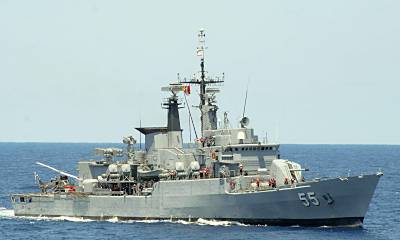WASHINGTON, Oct. 17, 2011 — The military is using an old camping adage as U.S. Forces Iraq continues to move service members out of Iraq and transfer control to the Iraqi government: “Leave the site in better shape than you found it.”
“Eight years of continuous conflict has resulted in a substantial amount of equipment, supplies, property and personnel still in Iraq, and we’ll withdraw with the constant threat of enemy attack and the potential for bad weather, and we’re doing so in a deliberate, measured manner, ensuring we protect service members, civilians, contractors, equipment and property, and we intended turnover bases, and we have been, better than we found them,” Army Maj. Gen. Thomas W. Spoehr said during an Oct. 13 “DODLive” bloggers roundtable.
Spoehr � deputy commanding general of U.S. Forces Iraq — said the transition is of unparalleled magnitude. In 2008, U.S. forces numbered 165,000, residing on 505 bases, he said. Today, U.S. forces are 41,000 strong, living on 22 bases. On average, his mission still requires him to withdraw 520 people each day, he added.
The general said plans under the 2008 bilateral security agreement — which states that all U.S. forces will withdraw from Iraq by Dec. 31 — are on track. U.S. Forces Iraq is making the withdrawal with budgets in mind, Spoehr said, selling a large amount of equipment, infrastructure and recyclable waste to the Iraqi military and government agencies.
“We sold 6.8 million pounds of scrap just [this month], and since Sept. 1, 2010, we have sold more than 142 million pounds of unserviceable material through scrap sales,” he said. He added that the sale of equipment has saved American taxpayers $600 million in shipping and transport costs alone.
The ultimate choice to sell or relocate equipment is being made as deliberately as possible, the general said.
“We have about 788,000 pieces of equipment,” he said. “Each one of these kind of gets a scrutiny in terms of cost benefit and what’s the best disposition of that equipment. Obviously, our first priority would be to satisfy any kind of in-theater requirements. So if there was a piece of equipment that was needed in Afghanistan to prosecute a war there, or for another military need, we would utilize that first.”
Spoehr said the transition hasn’t been simply a military-to-military transfer. Iraqi government agencies have their eyes on soon-to-be former American facilities.
“One of these bases, I think it was Warhorse, was signed for by the ministry of youth and sports, and so they intend to make that base a kind of a sports camp for Iraqi youth, where they can maybe spend a week or so and learn to play soccer or things like that,” he said. “The government of Iraq in some cases has kind of gone different directions and plans to give some of these bases to some of their other ministries.”
Spoehr explained that in the end, cleaning up bases and equipment is more than a matter of dollars and logistics. For him, it’s a matter of respect.
“As we turn over each base, it’s kind of our point of pride that we’re turning it over better than we found it,” he said.
Source:
U.S. Department of Defense
Office of the Assistant Secretary of Defense (Public Affairs)

 von
von 
